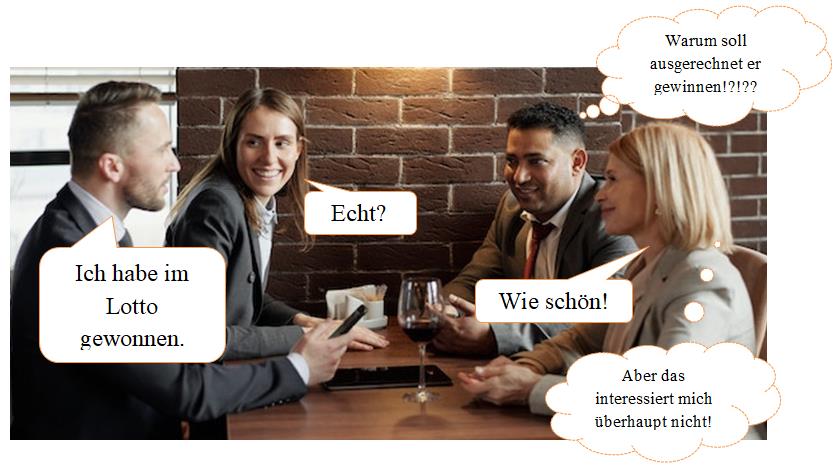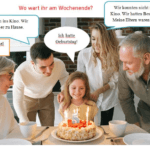Particles or small words are very common in spoken German, you can hear them at every turn. But what exactly do they mean, and this is where the problem arises, because there is no strict translation, they are there to set the tone, strengthen the meaning of the statement, they can be used to express various subtle feelings, for non-native speakers they are not that important, but native speakers are happy to use them and their language sounds much more pleasant with them.
Thank you for reading this post, don't forget to subscribe!CONTENTS
What are particles in German?
Features of particles
Types of particles
Gradpartikel/ Grading particles
Modalpartikel/ Modal particles
Fokuspartikel/ Focus particles
Negationspartikel/ Negation particles
Gesprächspartikel/ Sentence equivalents
Ausdruckspartikel/ Exclamations
What are particles in German?
The term “Particle” or “Partikel” in German is a grammatical term that actually means “a fraction” in Latin, specifically “a particle.”
Particles fulfill different functions, mainly in spoken language. They indicate, among other things, degree or intensity, are used for emphasis, express the speaker’s inner attitude, and play an important role in conversation.
All particles share the characteristic of being non-inflected words and not having a real meaning or grammatical function. Additionally, particles do not appear as sentence parts, neither as subjects nor as objects.
They always represent other inflexible types of words.
For examples:
Es regnet, aberes ist nicht kalt.(=conjunction)
Jetzt aber schnell.(= particle)
Ihr eigentlicherName ist Marianne, aber alle nennen sie Marie.(= adjective)
Eigentlichist sie älter.(= adverb)
Kennst du sie eigentlich näher?(= particle)
Click on:
Grammar Contents
Features of particles
Particles give the language a sense of vibrancy, and they can convey a positive or negative tone to the entire sentence, expressing the speaker’s feelings. While it is possible to omit them and still be understood by a German speaker, using particles certainly enhances the sound of the language.
Types of particles
We can divide them into:
Gradpartikel/ Grading particles
Modalpartikel/ Modal particles
Fokuspartikel/ Focus particles
Negationspartikel/ Negation particles
Gesprächspartikel/ Sentence equivalents
Ausdruckspartikel/ Exclamations
Gradpartikel/ Grading particles
Grading particles offer the speaker the ability to enhance or diminish the meaning of the adjective or adverb that precedes them.
For example:
Das ist toll. – That’s great.
Das istwirklich toll. – That’s really great.
Das istnicht so toll. – That’s not so great.
Grad particles that serve to diminish the meaning of the adjective:
sehr (++very): Das Essen war sehr reichlich.
besonders (++especially): Er ist besonders nett.
total (++ totally): Die Straße war total überflutet.
wirklich (++ really): Das tut mir wirklich Leid!
echt ( ++ genuin): Sie ist echt lieb.
ziemlich (+ pretty): Mia hat ziemlich viel Humor.
absolut (++ absolutely): Ich bin mir aboslut sicher, dass er kommt.
einigermaßen (+ somewhat): Ich bin einigermaßen sicher, dass sie kommt.
Grad particles used to weaken adjectives or adverbs:
nicht so (+not so): Seine Vorlesung warleider nicht so interessant.
nicht besonders ( + not particularly): Die Vorstellung war auch nicht besonders gut.
gar nicht ( ++ not at all): Den Tisch finde ich gar nicht schön.
überhaupt nicht ( ++ not at all): Das finde ich überhaupt nicht lustig.
Modalpartikel/ Modal particle
Modal particles are very often used in spoken language. You probably recognize them: ja, denn, doch, eigentlich, mal … MAL is the best-known of all particles in German. This is the first thing you hear, as soon as you arrive in Germany: “Guck mal!”,”Sieh mal!”,”Komm mal her”. Each particle has several different meanings. Modal particles are primarily used in spoken language to express the feelings and mood of the speaker.
For example:
Without the particle the meaning is neutral: Kannst du das?
Whit the particle sounds more polite: Kannst du das denn?
Both sentences have the same meaning, only the second sentence sounds kinder to a native speaker. It is difficult for a non-native speaker to learn the use of modal particles, because they do not have a specific meaning, so many choose not to use them.
See the lesson: Modal particles in German
Fokuspartikel/ Fokus particle
Focus particles have the function of emphasizing certain segments of the sentence. They stand, in front of the very segment that is to be highlighted.
For example:
Er hat bis jetzt erst zweimal gewonnen.-Do sada je pobediosamodvaputa.He’s only won twice so far.
Ausgerechnet du musst das sagen! –You of all people have to say that!
The most important focus particles are: allein, ausgerechnet, besonders, wenig, etwa ,etwas, einigermaßen,erst, fast,nur, selbst, sehr, sogar, , vor allem, ungemein, überaus, äußerst, ziemlich, höchstens, wenigstens, spätestens, zuminsest …
Click on:
Grammar Contents
Negationspartikel/ Negation Particle
Only one particle has a negative meaning. It is the particle nicht. With it, we negate one part or the entire content of the sentence.
If we negate one part of the sentence, then the verb stands in front of the part that is being negated.
For example:
Mia kannnichtim Buslernen.
Ukoliko se negira čitav sadržaj, onda u nezavisnim rečenicama nicht stoji iza glagola. U zavisnim rečenicama nicht se nalazi ispred glagola na kraju rečenice.
If the entire content is negated, then in independent sentences nicht stands after the verb. In dependent clauses, nicht is placed before the verb at the end of the sentence.
For example:
Mia kann nicht lernen.
Woher weißt du, dass sie nicht lernen kann?
Gesprächspartikel/ Sentence equivalents
These particles stand in the sentence as autonomous elements. They can stand in place of a sentence. They can be used as an answer to a question, for example: ja, nein, doch, eben, okay …, bitte, danke. They can also be an introduction to conversation: bitte, los, also, hallo, greetings: hallo, tschüss.
For example:
Kommst du um 8 Uhr? – Nein
Hat sie dich nicht angerufen? – Doch
Los, mach schon!
Ausdruckspartikel/ Exclamations
Exclamations are a subset/ subgroup of particles. We classify them as interjections (Interejection). They express spontaneous expressions, such as feelings of joy, pain, fear, surprise, repulsion, disgust…
For Example:
joy:Juhu! Hurra! Ah!
pain:Au! Aua! Autsch!
fear:Uh! Huch! Uff!
discust:Pfui! Igitt! Uh!
surprise:Oh!, Oho! Ach! Hoppla! Oje! He! Ah!
outrage:He!
astonishmen:Ah!
I will include onomatopoeia in this group, that is, imitation of sounds, voices and noises from nature.
For example:
bum, peng, boing, kikeriki, wau, wuff, miau, quak, tatütata; schwupps, zack,puff, blub-blub, …
See more:


